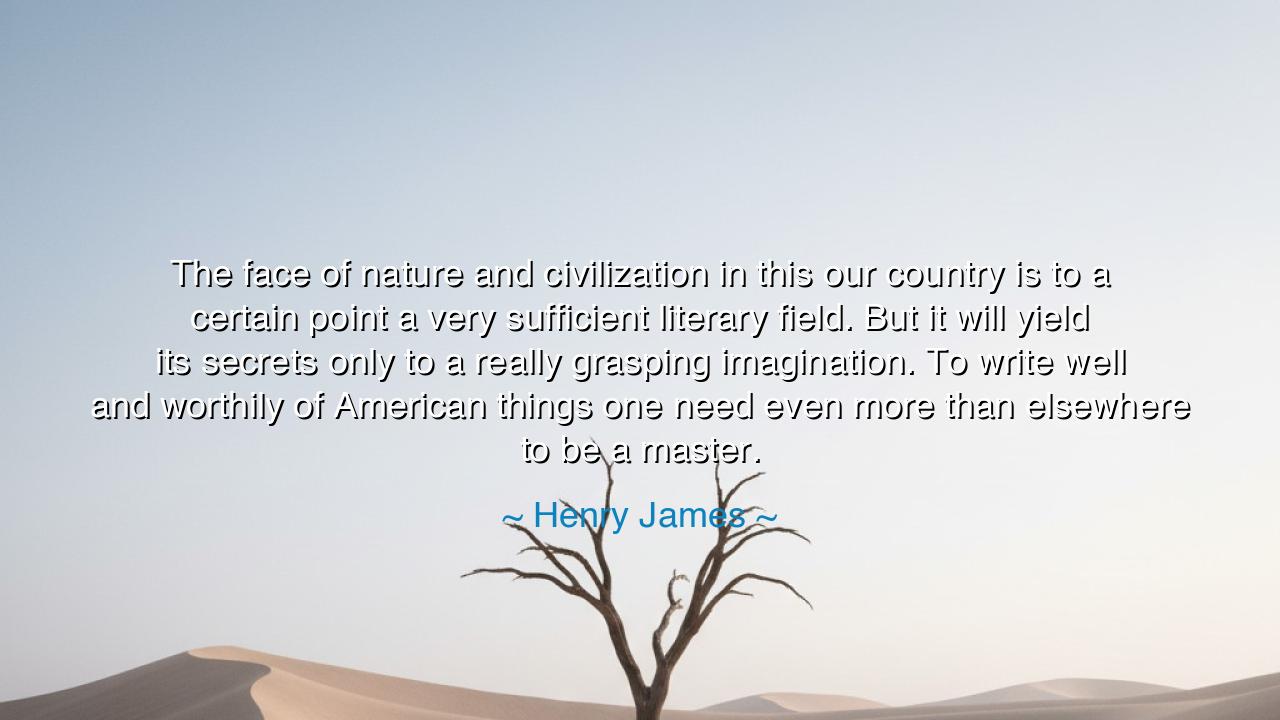
The face of nature and civilization in this our country is to a
The face of nature and civilization in this our country is to a certain point a very sufficient literary field. But it will yield its secrets only to a really grasping imagination. To write well and worthily of American things one need even more than elsewhere to be a master.






In the sacred realm of letters, where the spirit seeks to capture the essence of a people and the soul of a land, Henry James spoke thus: “The face of nature and civilization in this our country is to a certain point a very sufficient literary field. But it will yield its secrets only to a really grasping imagination. To write well and worthily of American things one need even more than elsewhere to be a master.” These words, though spoken of America, echo beyond its shores and ages; they speak to every writer, every thinker, every dreamer who dares to describe the living world around them. They remind us that to perceive deeply is to imagine greatly, and that to write of one’s land is to wrestle with its heart.
For what James reveals is no easy truth. He speaks of the face of nature and civilization—the twin forces that shape a nation’s soul. Nature, with her vast rivers, silent mountains, and whispering forests; civilization, with its restless cities, its ambitions, and its griefs. Together they form a tapestry of endless complexity. To behold this tapestry and render it faithfully in words is no small task. It demands not the casual observer, but the master—one whose imagination can pierce beyond surfaces and draw forth the hidden spirit of things. For the land, like a god, reveals itself only to those who approach with reverence and strength.
Consider, then, the story of Walt Whitman, that bard of democracy and the human heart. In the hum of the city, in the whisper of grass, he found his song. Others saw only streets and crowds; Whitman saw the living pulse of America. His imagination transformed mere observation into revelation. He wrote not of a place alone, but of an idea—of the human soul stretching itself across prairies and through the veins of nations. He was not merely a writer; he was a seer, proving James’s truth that to write worthily of one’s land is to possess mastery not just of words, but of vision.
And yet, James’s words bear a deeper challenge. He reminds us that the secrets of the world—be they of nature or of man—are not given freely. They are hidden behind the veil of the ordinary, and only the really grasping imagination can lift that veil. To see beauty in decay, meaning in silence, grandeur in simplicity—this is the gift of the master. For imagination is not fantasy, but the divine faculty of understanding the invisible through the visible. It is the bridge between what is and what is felt, between history and eternity.
Such mastery does not come through talent alone. It demands devotion—years of seeing, listening, and suffering with awareness. The writer must walk the streets of his people, feel their hungers, touch the soil that bore them. He must not write merely to decorate truth, but to uncover it. The world, James tells us, does not yield to the lazy eye or the idle mind. It opens itself only to those who labor to know it wholly, who combine intellect with empathy, and imagination with courage.
But this lesson is not for writers alone. Every soul, in every craft, must learn what James teaches: that to understand anything deeply—whether a nation, a person, or the self—requires a grasping imagination and a master’s spirit. The scientist who sees only formulas and not wonder will never change the world. The leader who sees only numbers and not souls will never uplift it. Mastery begins not in knowledge, but in vision—the ability to see what others do not yet perceive.
Therefore, let this teaching be carried into your own life: Look at the world not with haste, but with imagination. Seek not only what is, but what might be revealed beneath it. Read the landscape of your life as a writer reads his homeland—with patience, with awe, with reverence. Whatever your art may be, whether of word, hand, or heart, let it be done with mastery born of imagination. For the land, the people, and the soul of the age will only yield their secrets to those who dare to see them whole.
And thus the words of Henry James stand as a timeless commandment: To write well and worthily, one must be a master of vision. For it is not enough to describe; one must awaken. It is not enough to observe; one must feel. The face of nature and civilization, in every time and place, awaits those who will see it truly—and through the power of imagination, reveal its eternal light to the generations yet to come.






AAdministratorAdministrator
Welcome, honored guests. Please leave a comment, we will respond soon